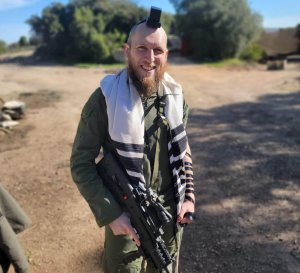
This Chabad Rabbi Started a Life-Saving Organization for IDF Lone Soldier Veterans
When Rabbi Ari Abramowitz talks about lone soldiers, his voice carries the weight of personal experience and the vision of someone building something revolutionary. “We’re the most amazing community of people who all went through this together,” he says. “There’s nothing wrong with saying you need help. We’re all here for each other—no matter what.”
Abramowitz, a Chabad rabbi and IDF reservist, is the founder of Nevut, a premier mental health and community support network for IDF lone soldier veterans and their families living across the United States. His mission: to ensure that those who volunteered to serve in the IDF despite not being Israeli citizens are embraced and supported when they return home.
Raised in Monsey, NY, in a family that became religious through the legendary Rebbetzin Esther Jungreis, Abramowitz grew up deeply connected to Jewish life. His family found a home in the Chabad community, and Ari attended Chabad schools throughout his childhood.

After high school, he went to study in a yeshiva in Israel. “There were rockets that fell in Sderot when I was there—no Iron Dome, nothing,” he recalls. “We’d run to bomb shelters and pray it didn’t land on us. It was surreal.” Then came the 2008 Mercaz HaR
av massacre in Jerusalem, in which eight students were murdered.
These experiences were life-altering for Abramowitz. Though committed to learning, sitting in the beit midrash didn’t come naturally. “Joining the IDF was a way I could give back, help the Jewish people, and do something meaningful by pushing myself to my limits—giving all I had,” he says. In 2009, he enlisted as a sharpshooter.
As an Orthodox Jew joining the IDF, he faced skepticism. “There was a lot of pushback—people saying, ‘You’re going to become not religious.’” Instead, his commitment deepened. “I was going for the right reasons. I wanted to help, make a difference, and be in a place where I could succeed.” He embraced the Chabad idea of being a shaliach—an ambassador for Torah values—wherever he was, even in uniform.
After completing his initial service, Abramowitz returned to the U.S., earned his rabbinic ordination, married his wife, and later moved back to Israel to run a lone soldier program. In 2015, he rejoined the reserves—a commitment he still maintains.
It was while leading that program that he noticed a troubling gap: once lone soldiers returned to the U.S., they were entirely on their own. They didn’t qualify for American veteran benefits and no longer had access to Israeli programs.
The urgency hit home when a former lone soldier called him in crisis, saying, “I have a big black hole in my heart. I’m not going to make it out today.” Abramowitz quickly connected him to professionals. “We were able to help him, but then we realized—there’s no community of support in the United States.”
That was the seed of Nevut, from the Hebrew for “navigate.” “In the military, you navigate with a map. In life, you also need a map,” he explains. “For us, ‘MAP’ stands for ‘Meaning And Purpose.’ That’s what the army gave me, and that’s what we want to give these veterans as they navigate civilian life.”
Abramowitz knows the soldier’s mindset: “I’m going to do whatever it takes, and I’m going to be the best I can be to protect Am Yisrael. The biggest challenge comes after you finish—you’ve been climbing to the top, and suddenly you crash. You’re left wondering, ‘What do I do now?’”
Nevut answers that question with three pillars:
- Community – Building local groups where lone soldiers connect, support each other, and share life beyond service.
- Mental Health – Offering therapy, group sessions, case management, and financial aid for treatment when needed.
- Employment – Assisting with resumes, job searches, and career transitions.
By October 6, 2023, Nevut was serving over 900 soldiers. On October 7, that mission intensified. Calls poured in as lone soldier reservists were mobilized and needed gear, flights, and someone to talk to. While others focused on immediate needs, Abramowitz was already thinking ahead: “Don’t forget about the battle after the war—what these soldiers are going to experience coming home.” Nevut also expanded services to include spouses and parents of deployed soldiers.
Abramowitz himself returned to the frontlines. But one tragic mission happened when he was home—four of his teammates were killed in Lebanon while dismantling a Hezbollah weapons cache. “These were my guys for ten years,” he says. “Nothing can prepare you for that.” One was his confidant, Sammy Harari HY”D, and another was Aviad Neiman HY”D, whose photo now sits on Abramowitz’s desk—always within reach.
The loss was devastating. “For my own sanity, I had to be with my team,” he says. Two weeks before his wife was due with their sixth child, he returned to the reserves in Lebanon—calling his wife “the biggest hero” for supporting his service, their family, and the organization’s mission.
At Nevut events, Abramowitz often asks veterans questions to learn more about them. One favorite: “Who’s your favorite biblical character?” His is Yehuda. “The guy’s a legend. He owned up to a huge mistake, and at the end of the day, he stood up for his brother and did whatever it took. That’s a real leader—human enough to admit fault, but strong enough to stand for what’s right.”
For Abramowitz, Nevut is about connection. Sometimes that means dramatic, Hollywood-worthy reunions—like two soldiers who met at a Nevut event in Manhattan and realized they’d fought together in Gaza. Other times, it’s long-delayed healing—like a 1982 Lebanon War veteran who reconnected with his commander via a Facebook group and finally found peace.
“You don’t have to be macho if you’re struggling. We have to take away the taboo of mental health,” is Abramowitz’s message to veterans and reservists. “We have the most amazing community of people that all went through this. Whether you’re in a good place or bad place, we’re here for each other no matter what.”
His call to the Jewish community is clear: “Don’t just think about the lone soldiers in Israel. They’re back here, in our own ZIP codes—our neighbors, our nieces and nephews. Everyone must think: I’m going to do whatever it takes to make sure these heroes are taken care of.”
Nevut continues to grow, from social events to therapy subsidies, and is now preparing for its September 7th Ride & Run at Lake Welch in Harriman State Park, New York—a chance for the entire community to ride or run alongside these heroes and say, “We’re with you.”
If you found this content meaningful and want to help further our mission through our Keter, Makom, and Tikun branches, please consider becoming a Change Maker today.







